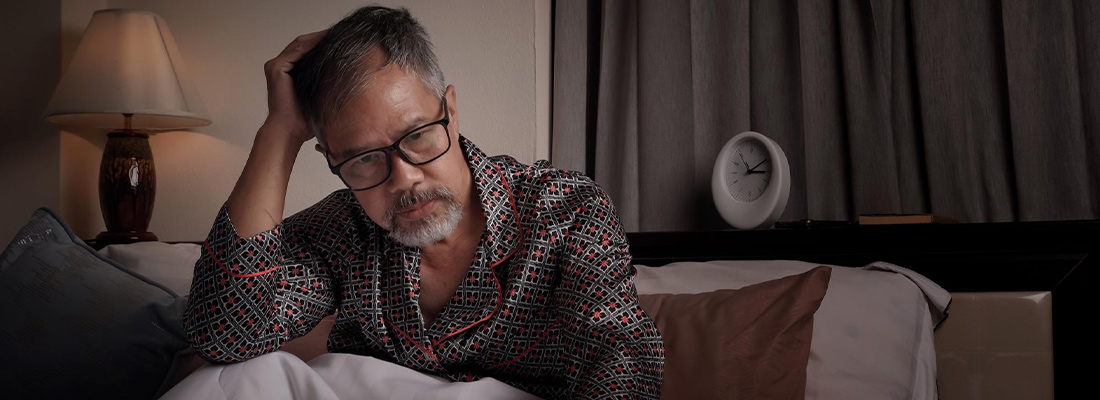
Insomnia is a common sleep disorder that affects people of all ages, not just older adults or those who are stressed or depressed. Anyone can experience insomnia at some point in their life. Common signs include trouble sleeping and feeling very tired during the day. Insomnia can manifest in various ways, such as difficulty falling asleep at night, waking up frequently, having bad dreams, and feeling tired throughout the day. Interestingly, women are more likely than men to suffer from insomnia.
The National Sleep Foundation estimates that 10% to 30% of adults in the United States experience insomnia, making it a widespread issue that can greatly affect one’s quality of life. There are different types of insomnia based on how long the symptoms last. One specific type, terminal insomnia, involves waking up earlier than desired and being unable to fall back asleep. Despite its alarming name, terminal insomnia is not fatal but can significantly impact daily life, leading to daytime sleepiness and difficulty concentrating. In this blog, we will discuss the symptoms, causes, and treatment of terminal insomnia.
Read our blog: Is Insomnia Hereditary? What The Research Shows
Symptoms of Terminal Insomnia:
The following are the symptoms of terminal insomnia:
Mood Disorders
Long-term sleep deprivation can lead to a variety of mood disorders. You might experience anxiety, depression, irritability, and other emotional disturbances. These symptoms can worsen over time if you continue to lack quality sleep, potentially leading to more severe mental health issues.
Also Read: Psychophysiological Insomnia: Everything You Need to Know!
Weight Gain
Insomnia can disrupt the hormones that regulate hunger, potentially leading to increased appetite and weight gain. Sleep-deprived individuals may crave high-calorie foods and lack the energy to exercise.
Excessive Daytime Sleepiness
Waking up too early and being unable to fall back asleep can result in severe daytime drowsiness. Persistent sleep disruption may lead to chronic fatigue syndrome, narcolepsy, and in extreme cases, significantly impact overall health and well-being.
Note: To better understand narcolepsy, you can read our blog on ‘Is Narcolepsy a Disability?’
Cardiovascular Issues
Prolonged sleep disturbances have been linked to an increased risk of cardiovascular problems, including hypertension, heart disease, and stroke.
Difficulty Concentrating
A consistent lack of sleep can impair your ability to focus and stay alert throughout the day. This can negatively impact your productivity and overall cognitive performance.
Memory Issues
Insufficient sleep affects both short-term and long-term memory. When you don’t get enough sleep, your brain lacks the necessary stimulation to effectively store information. This results in difficulty retaining new information and properly consolidating memories over time.
Causes of Terminal Insomnia:
Terminal insomnia, also known as early morning awakening insomnia, can be caused by various factors that disrupt your sleep patterns.
- Stress and Anxiety: Persistent stress and anxiety can cause racing thoughts that wake you up early in the morning and prevent you from falling back asleep. Moreover, anxiety triggers a ‘fight or flight’ response, leading to physical symptoms like increased heart rate and sweating, making it hard to relax.
- Depression: Depression often disrupts sleep, particularly causing early morning awakenings. Negative thoughts and feelings of hopelessness can interfere with sleep quality, leading to terminal insomnia or excessive daytime sleepiness.
- Chronic Pain: Conditions like arthritis, back pain, fibromyalgia, and headaches can cause discomfort that makes it hard to find a comfortable sleeping position or stay asleep. Medications used to manage pain might wear off during the night, leading to awakenings and difficulty returning to sleep.
- Substance Use: Excessive use of caffeine, or alcohol, especially close to bedtime, can disrupt sleep patterns and contribute to early awakenings.
- Jet Lag: Traveling across different time zones disrupts your internal body clock, known as the circadian rhythm. This confusion can result in difficulty falling asleep or waking up too early due to a mismatch between your body’s internal clock and the new environment.
These factors contribute to terminal insomnia by either directly disrupting sleep patterns or exacerbating underlying issues like stress, anxiety, or physical discomfort. Hence, treating these issues can help improve sleep quality and manage terminal insomnia effectively.
Treatment for Terminal Insomnia:
Terminal insomnia can be managed in the following ways:
Cognitive Behavioral Therapy for Insomnia (CBT-I)
Cognitive Behavioral Therapy for Insomnia (CBT-I) is designed to help you manage or eliminate the negative thoughts and behaviors that prevent you from sleeping. It is often recommended as the primary treatment for insomnia, proving to be as effective, if not more so, than sleep medications.
Cognitive Techniques
The cognitive aspect of CBT-I focuses on identifying and modifying beliefs and thoughts that interfere with sleep. This approach helps you challenge and change negative thoughts and worries that keep you awake. Furthermore, it aims to break the cycle of anxiety about falling asleep, which can paradoxically keep you awake.
Behavioral Techniques
The behavioral component of CBT-I teaches you healthy sleep habits and helps you eliminate behaviors that hinder good sleep. Key strategies include:
Conditioning Your Mind and Body
Stimulus Control Therapy: This technique trains your mind and body to associate the bed with sleep and not with other activities. It involves setting a consistent bedtime and wake-up time, avoiding naps, and using the bed only for sleep and sex. So, if you can’t fall asleep within 20 minutes, you’re encouraged to leave the bedroom and return only when you feel sleepy.
Relaxation Practices
Relaxation Techniques: Methods such as progressive muscle relaxation and breathing exercises help reduce bedtime anxiety. These practices can help you control your breathing, heart rate, and muscle tension, promoting relaxation and easier sleep.
Adjusting Sleep Patterns
Sleep Restriction: This strategy involves limiting the time spent in bed to increase sleepiness the next night. Initially, you reduce your time in bed and avoid naps, making you more tired. As your sleep improves, you gradually extend your time in bed.
Reducing Sleep Anxiety
Remaining Passively Awake: Also known as paradoxical intention, this approach involves trying to stay awake instead of expecting to fall asleep. This reduces the pressure and anxiety around sleeping, which can actually make it easier to fall asleep.
Using Herbal Remedies
Natural Remedies: Herbal remedies like chamomile tea, valerian root, ginger tea, and lavender oil are popular natural options for promoting relaxation and improving sleep quality. So, incorporating these herbal remedies into a nightly routine can help prevent sleep disruptions and support a more peaceful sleep experience naturally.
Incorporating Exercise
Physical Activity: Regular exercise can significantly improve sleep quality. Engaging in physical activities such as walking, jogging, swimming, or cycling can help you fall asleep faster and enjoy deeper sleep. However, it’s important to time your exercise appropriately; exercising too close to bedtime can have a stimulating effect, making it harder to fall asleep. Aim to finish your workout at least a few hours before going to bed.
Conclusion
In conclusion, terminal insomnia is characterized by early morning awakenings and difficulty returning to sleep. While various factors such as stress, anxiety, depression, chronic pain, substance use, and jet lag contribute to this sleep disorder, effective management strategies exist. Cognitive Behavioral Therapy for Insomnia (CBT-I), focusing on cognitive and behavioral techniques, stands out as a highly effective treatment. Lifestyle adjustments, relaxation practices, and sleep hygiene improvements also play crucial roles in improving sleep quality. Addressing these factors with appropriate therapies and habits can help individuals regain control over their sleep patterns and lead to better overall health outcomes.

